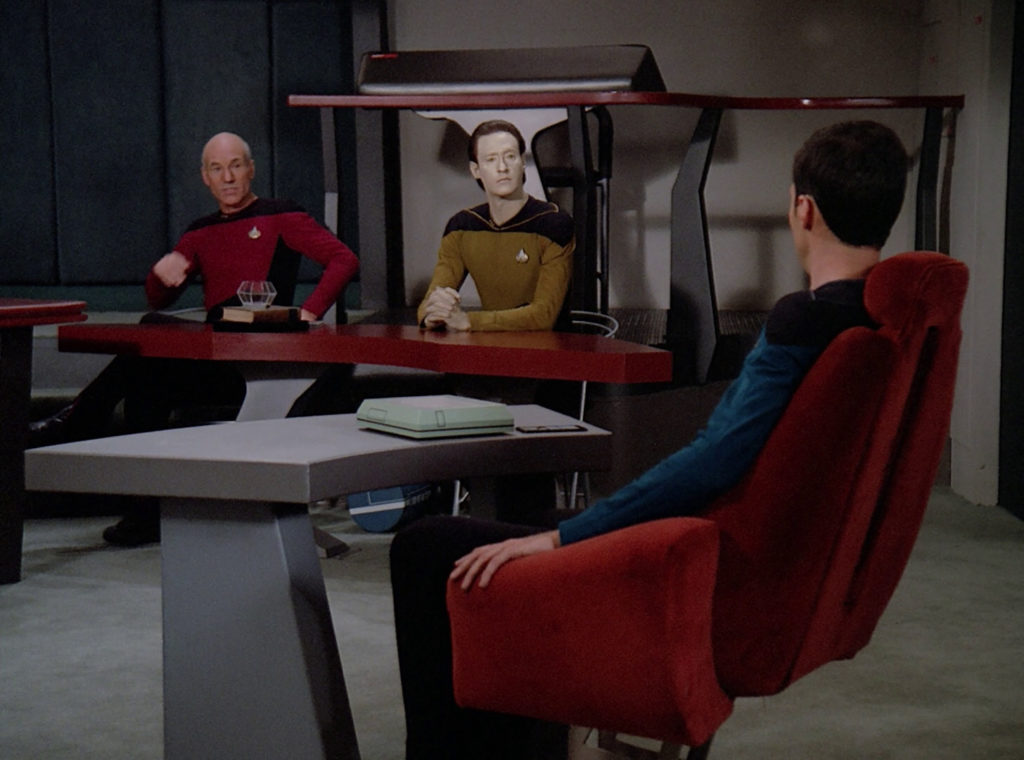In this week’s module, the film Marjorie Prime and the Star Trek episode “Measure of a Man”, demonstrated the different ways in which memory can be represented and utilized in understanding one’s identity. In the film, Marjorie speaks to a hologram version of her dead husband called Walter Prime, who was brought in to give her comfort at the end of her life. I think it’s interesting because each of the Primes are given information by the loved ones in order to act in the most realistic and accurate way, but they are receiving skewed versions of events (to no one’s fault but the fact that each person has a different experience). But, it should be noted how some characters would leave out information while speaking to the Primes, and we can see how those gaps of information cause some confusion with the Primes in the very final scene.

We see this when Tess has a conversation with Marjorie Prime, and explains their strained relationship, or the relationship she had with the real Marjorie. After the real Marjorie dies, Tes admits to Jon that she just wanted her mother to love her as much as she loved her brother Damien (1:09:30). Jon tells Tess that “She did, it was obvious from a little further away”. This reminded me of something I heard in the lecture which stated that “memory change over time as we construct and think about them through different contexts and from different perspectives”. Tess never got to see what her experience with her mother looked like from an outsider’s point of view, and Jon is trying to comfort her with the idea that Marjorie did love her, and it was easier to see for him. Tess’s relationship with Marjorie Prime won’t replace the memories and experiences she had with her real mother, but it does add on to the dynamic she might have while looking back on those memories. This supports the idea from the lecture that “memory is influenced by content, emotion, and environment”. We find out later on that Tess takes her own life, but for the sake of the argument, if she did find closure and emotional healing while spending time with Marjorie Prime, that could have an effect on how she remembers the interactions with the real Marjorie.
One concept that I think the film portrayed in an interesting way was the extended cognition. The Primes are examples of cognitive integration, which is “the brain, body, external tools and technology, interpersonal and social supports, and culture create complex and interactions that form a cognitive system”. The characters are able to speak to the Prime’s about past events in order to help the piece of technology undergo the process of becoming an accurate representation of the person.

In Marjorie’s case when she had Walter Prime, he was able to help her remember things that she wasn’t able to in her old age. But, it was Marjorie herself (as well as Jon) who gave Walter Prime the memories in the first place. It was like watching them prepare a tool that they knew would eventually help them in the future. In one scene, when Tess is talking to Marjorie Prime(1:02:10), she says “Do you have emotions? Or do you just remember ours, do you feel anything?”. Tess is trying to get an understanding for how the Prime is taking in and internalizing what she is telling it. Is the Prime able to connect certain feelings to the memories, or is it just “storing it away” until it is needed for recall. This made me think back to the film Inside out, and how each memory had an emotion attached to it. The Primes have what I thought of as an “artificial” emotion attached to what they are told. I think this also leads into the idea of a constructivist’s view of memory. Because the Primes did not experience these events themselves and are only told how the real version of themselves felt during it, they are not able to construct memory. The people who speak them construct the memory and the Primes simply remember it, as we hear them say throughout the film “I’ll remember that next time”. Remembering and actually having the memory are two different things. Their idea of “self” is not their own.
In the Star Trek episode, I think we see through Data how emotions are so closely knit with memory. In the scene where Maddox is explaining the procedure he will do on Data he states that “I will run a full diagnostic on Data, evaluating the condition of its current software. I will then dump its core memory to the Starbase mainframe computer” (9:21). Data is an android, and his memory seems to be something that can be separated from his body, but we know that the body is a tool that helps the mind process and take the interactions around it. We heard the term “core memories” in Inside Out, and we know that in that film, the core memories are what makes a person themselves, it creates individuality.

The episode focuses on the argument that questions if Data should be considered property, or if he is his own person. Data has experiences with the other crew members, most of them being his friends. Maddox goes to Data again and tries to convince him to do the procedure, assuring him that his memories will remain intact afterwards (16:27). Data replies saying “Reduced to mere facts of the events. The substance, the flavor of the moment could be lost..I do not believe you have acquired the expertise necessary to preserve the essence of those experiences. There is an ineffable quality to memory which I do not believe can survive your procedure”. Data is trying to point out that as our lecture stated, “we experience emotions when we remember, both of the memory itself, and how we feel about the memory”. Data doesn’t want to lose that element of himself because without the feelings attached to those memories they won’t have significance to him and his relationships he has with the other crew members anymore.
4 thoughts on “Do you Remember?”
Hi Sarah,
I love you point about how our memories can change based on context and perspective. And connecting it to Tess’s Marjorie Prime is really interesting. One of the things that I am struck by is that if Tess believes that her mother didn’t love her as much as she did her brother, this is going to affect the AI’s programming, so that Marjorie Prime will also remember herself loving her son more than her daughter, which will reinforce Tess’s memory of her mother’s emotional distance from her. As you note, her interactions with Marjorie Prime will influence her memory of her relationship with her mother.
Great observation of the Primes as an example of the extended cognition. You make a great point about how the Primes are designed to remember things that we forgot. But, of course, if we are misremembering things—or desire to change our pasts—the Primes will repeat that misremembered information. Notice, for example, the different stories of Walter’s proposal to Marjorie that we get throughout the film. This connects to the point about memory that came up in the film—we remember not the event itself, but our memory of it.
Excellent analysis of the relationship between memory and emotion, which is something that connects these two texts (and Inside Out, as you note). Our emotions are inseparable from our memories, which is something that Inside Out captures really powerfully. If Data loses the emotion of his memory, what does that do to the sense of self that he’s constructed?
Jessica Hautsch
I think Data would lose the individuality of his constructed self. He would no longer be able to understand his friendships/relationships with the other crew members. I think emotion also plays a big part in our decision making process, so he won’t be able to comprehend why he does certain things (the motive behind it). The memories would no longer be his own without any emotions attached, it could be anyone’s, without his identity tied to it. If they created a whole race of Datas with no emotions attached to memory it would be hard to distinguish them as individuals.
Sarah Murphy
Hi Sarah,
Yes! These are all fantastic point! Yes! This is, I think, the importance of the card game at the start of the episode. Data was behaving entirely logically, but he lost. We don’t make decisions that way–in fact we can’t! Our emotion plays an integral role in all aspects of our cognition.
Jessica Hautsch
Hey,
I must start on saying that every week your blog post is on point. They are one of the biggest reasons that I understand the texts so well. So first, thank you. Secondly when you brought up the fact that these primes only know specific things about the loved one are from the information by the loved ones. I honestly can’t see myself doing that, talking to my late husband hologram, and basically telling him our stories and memories to make it easier for this hologram to understand. Thank goodness that Jon was there to help and make that process easier.
gcoito